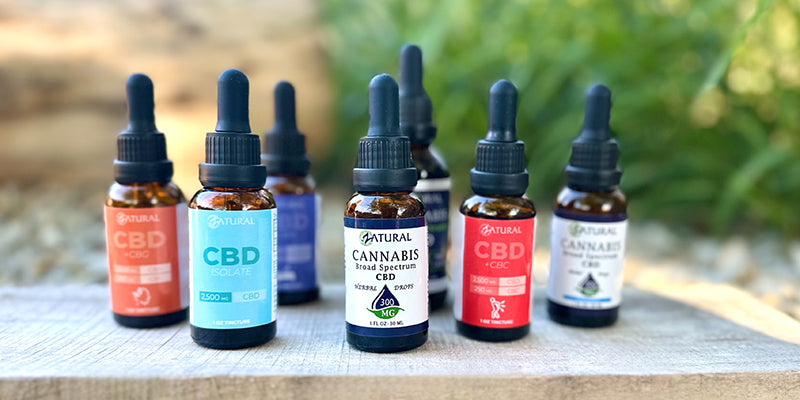Welcome to our blog, where we're diving into the wonderful world of CBD oil. If you're curious about what CBD is and why it's gaining so much buzz, you're in the right place.
In this blog, we'll demystify the world of CBD oil, breaking down the basics and highlighting the compelling reasons why you might want to consider incorporating it into your wellness journey. No jargon, no complex language—just a straightforward guide to help you navigate the fascinating realm of CBD.
Whether you're a seasoned wellness enthusiast or someone just stepping into the world of natural remedies, join us as we unravel the secrets of CBD and explore the reasons behind its growing popularity.
What Is CBD Oil?
For starters, CBD oil is a mixture of pure cannabidiol (CBD) — derived from either industrial hemp or marijuana. Also a carrier oil, such as coconut oil, hemp seed oil, sunflower oil, avocado oil, grapeseed oil, or (perhaps the most popular of all) unrefined coconut MCT oil.
CBD is one of the many naturally occurring compounds found in the cannabis plant, alongside tetrahydrocannabinol (THC). But, unlike THC, CBD is non-psychoactive. This means it doesn't cause the “high” feeling that THC does.
CBD or hemp extract started gaining mainstream traction when the 2018 Farm Bill was passed into law, recategorizing hemp as an industrial crop rather than a controlled substance.
But CBD has already been touted as a health alternative even before this happened thanks to its potential health benefits, including possible relief from mental and physical discomfort as well as skin issues.
Today, the demand for CBD-infused products keeps skyrocketing, with sales reaching an impressive $5.3 billion in 2021 in the United States alone.

These products, which include oils, creams, patches, beverages, edibles, and even pet food, are projected to generate a whopping $12 billion by 2024.
The popularity of CBD-infused products is undeniable, but the lack of FDA regulation and conclusive research to prove its wide range of benefits is enough to give everyone a reason to be cautious when incorporating them into their daily routine.
That’s why in this article, we’ll discuss in detail what CBD oil is and what its uses are so that readers can better educate themselves on not just the potential benefits but also the drawbacks of using CBD.
How Does CBD Work?
To comprehend the full impact of CBD on the body, it's crucial to first understand the endocannabinoid system (ECS).
This intricate network of cell receptors, neurotransmitters, and enzymes plays a critical role in regulating bodily functions that are essential to keeping a healthy mind and body.
What Is The Endocannabinoid System?
Although the ECS has existed within the human body for the last 5,000 years, it remains unfamiliar to many. In fact, the ECS’s existence was only discovered by scientists in 1988.
The ECS is thought to be one of the most extensive endocrine systems in mammals, controlling various essential bodily functions to achieve complete physiological homeostasis.
This is a phenomenon where all the body’s organs are working synergistically to maintain critical parameters of its internal environment within normal ranges.

If the ECS isn’t functioning properly, a variety of mental and physical health issues can take place.
Without too much detail, the ECS is present throughout the body — including the brain, organs, connective tissues, glands, and cells — in the form of cell receptors, enzymes, and neurotransmitters.
This is partly why CBD shows so much promise in potentially addressing a whole slew of health issues. Since the body already has the infrastructure that sets cannabidiol up for success in targeting specific problems when administered using the right delivery system.
To note, the research on CBD’s impact on the ECS remains scarce, and more studies are needed to prove if this is truly the case or not.
What Does Our Endocannabinoid System Do?
The ECS comprises two types of cannabinoid receptors with specific functions.
CB1 receptors are in charge of regulating most neurotransmitter activities, including hunger sensations, alertness levels, and temperature ranges.
CB2 receptors, on the other hand, can be found in immune tissues and play a key role in managing immune activity, intestinal movement, and bowel function.
The human body naturally produces endocannabinoids (which are structurally similar to molecules in the cannabis plant) to stimulate these receptors to do their jobs properly.
How Does Your ECS Work?
When the body’s natural endocannabinoids interact with CB1 receptors, they are able to regulate mood, emotion, bodily movement, appetite, and memory.
CB2 receptors, when stimulated by the body’s natural endocannabinoids, are able to ensure that the heart, liver, kidneys, blood vessels, bones, and reproductive organs function optimally.
When working in harmony, natural endocannabinoids, CB1 receptors, and CB2 receptors are able to achieve complete physiological homeostasis.
Now, the question remains: Does this mean that CBD oil, being rich in cannabidiol, can truly live up to its promise?
The short answer is: It’s possible.
What Types of CBD Are Available?
The world of CBD offers a rich tapestry of products catering to a variety of preferences and lifestyles. CBD oils and tinctures stand as the traditional go-to, allowing for precise dosage control through sublingual application.
For those seeking convenience, CBD capsules offer a pre-measured and easily ingestible option. Topical creams and balms infused with CBD provide targeted relief and are perfect for incorporating into skincare routines.
Edibles, such as gummies and chocolates, offer a tasty and discreet way to enjoy the benefits of CBD. Each product type has its unique advantages, making it possible for users to find the perfect fit for their needs and preferences.
CBD is also available in three different varieties. You have full-spectrum CBD products that contain the full cannabinoid profile, including less than 0.3% THC. You have broad-spectrum CBD that contains a broad variety of cannabinoids but is missing THC.
The last option is Isolate cannabinoid products. These types only contain a singular cannabinoid or are made with a cannabinoid isolate powder.
Whether you prefer the simplicity of drops, the ease of capsules, or the versatility of edibles, the diverse array of CBD products ensures there's an option suited just for you.
How To Use CBD
Incorporating CBD oil into your wellness routine is a straightforward process that begins with finding the right dose of CBD for you. Start by carefully reading the suggested CBD instructions because concentrations can vary.
Most commonly, users place a few drops under the tongue and hold them there for about 60 seconds before swallowing. This sublingual method allows for efficient absorption into the bloodstream.
Alternatively, you can add CBD oil to your favorite beverage or food, making it a seamless part of your daily rituals. Remember, consistency is key when using CBD, and it's advisable to start with a low dose, gradually increasing as needed.

Listening to your body's responses and consulting with a healthcare professional will help tailor your CBD experience to suit your unique needs.
What Are The Side Effects Of CBD?
As you embark on your journey with CBD, it's essential to be well-informed about potential side effects. While CBD is generally well-tolerated, individual responses can vary.
Common side effects include dry mouth and drowsiness, but fear not—these are typically mild and temporary. Hydration and adjusting the dosage can often alleviate these minor inconveniences.
While most individuals experience no adverse effects. Still advisable to consult with a healthcare professional before using CBD in your routine. Especially if you are taking other medications. Women who are pregnant or breastfeeding should not take CBD.
By staying informed and mindful of your body's responses, you can make the most of CBD's potential benefits while minimizing any potential side effects. Remember, the journey with CBD is unique for each individual, and a well-informed approach ensures a smoother ride.
Is CBD Oil Legal?
The legality of CBD oil is a complex terrain influenced by the Food and Drug Administration (FDA). Currently only one FDA-approved CBD product, but people can still sell CBD. CBD is also regulated by the government on a federal and state level.
In 2018, the U.S. Farm Bill federally legalized hemp-derived CBD containing less than 0.3% THC, separating it from marijuana and its psychoactive effects.
This move opened the doors for the cultivation, production, and sale of CBD products across the country. However, it's essential to note that state laws can vary, with some states imposing additional restrictions on CBD products.
Understanding local regulations is crucial, as a handful of states still maintain stricter policies around CBD. As the legal landscape evolves, staying informed about both federal and state guidelines ensures a confident and lawful engagement with CBD oil.
It's advisable to keep abreast of updates and consult local authorities or legal experts to navigate the nuances of CBD legality effectively.
Sum It Up!
Indeed, CBD is a fascinating compound that shows promise in offering numerous health benefits, including possibly assisting with the body's ECS function with maintaining balance and homeostasis.
Studies on CBD are still in their early stages, but there is already overflowing anecdotal evidence that supports its role in a robust daily wellness routine.
If you are looking for a reliable place to try CBD for the first time. Then look no further than Zatural CBD. Our CBD is the best CBD on the market. We carry a wide variety of high-quality CBD products that have been third-party tested.
Zatural CBD Products
This blog post is for educational purposes only.
*FDA DISCLAIMER -The FDA has not evaluated these statements.



